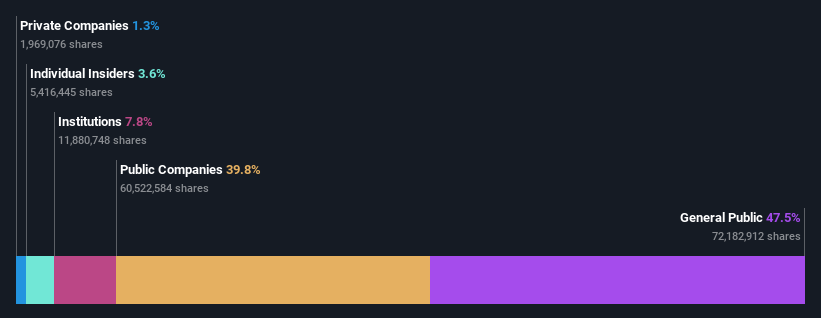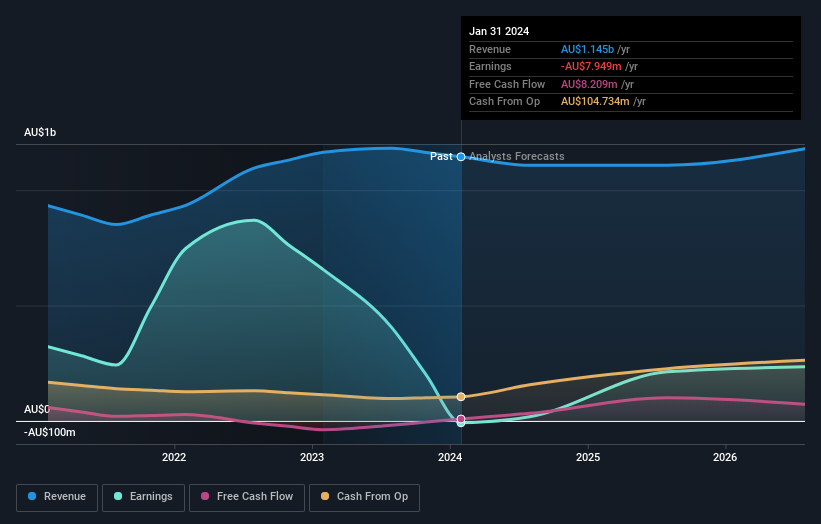Stock Analysis
- Australia
- /
- Basic Materials
- /
- ASX:BKW
Brickworks Limited (ASX:BKW) stock most popular amongst retail investors who own 47%, while public companies hold 40%

Key Insights
- The considerable ownership by retail investors in Brickworks indicates that they collectively have a greater say in management and business strategy
- 50% of the business is held by the top 15 shareholders
- Insiders have been selling lately
To get a sense of who is truly in control of Brickworks Limited (ASX:BKW), it is important to understand the ownership structure of the business. The group holding the most number of shares in the company, around 47% to be precise, is retail investors. That is, the group stands to benefit the most if the stock rises (or lose the most if there is a downturn).
Public companies, on the other hand, account for 40% of the company's stockholders.
In the chart below, we zoom in on the different ownership groups of Brickworks.
See our latest analysis for Brickworks

What Does The Institutional Ownership Tell Us About Brickworks?
Institutional investors commonly compare their own returns to the returns of a commonly followed index. So they generally do consider buying larger companies that are included in the relevant benchmark index.
As you can see, institutional investors have a fair amount of stake in Brickworks. This can indicate that the company has a certain degree of credibility in the investment community. However, it is best to be wary of relying on the supposed validation that comes with institutional investors. They too, get it wrong sometimes. It is not uncommon to see a big share price drop if two large institutional investors try to sell out of a stock at the same time. So it is worth checking the past earnings trajectory of Brickworks, (below). Of course, keep in mind that there are other factors to consider, too.

Brickworks is not owned by hedge funds. The company's largest shareholder is Washington H. Soul Pattinson and Company Limited, with ownership of 40%. In comparison, the second and third largest shareholders hold about 2.2% and 2.0% of the stock.
After doing some more digging, we found that the top 15 have the combined ownership of 50% in the company, suggesting that no single shareholder has significant control over the company.
Researching institutional ownership is a good way to gauge and filter a stock's expected performance. The same can be achieved by studying analyst sentiments. There are plenty of analysts covering the stock, so it might be worth seeing what they are forecasting, too.
Insider Ownership Of Brickworks
The definition of an insider can differ slightly between different countries, but members of the board of directors always count. Management ultimately answers to the board. However, it is not uncommon for managers to be executive board members, especially if they are a founder or the CEO.
Most consider insider ownership a positive because it can indicate the board is well aligned with other shareholders. However, on some occasions too much power is concentrated within this group.
Our most recent data indicates that insiders own some shares in Brickworks Limited. This is a big company, so it is good to see this level of alignment. Insiders own AU$147m worth of shares (at current prices). Most would say this shows alignment of interests between shareholders and the board. Still, it might be worth checking if those insiders have been selling.
General Public Ownership
The general public, who are usually individual investors, hold a 47% stake in Brickworks. This size of ownership, while considerable, may not be enough to change company policy if the decision is not in sync with other large shareholders.
Public Company Ownership
We can see that public companies hold 40% of the Brickworks shares on issue. This may be a strategic interest and the two companies may have related business interests. It could be that they have de-merged. This holding is probably worth investigating further.
Next Steps:
While it is well worth considering the different groups that own a company, there are other factors that are even more important.
I like to dive deeper into how a company has performed in the past. You can find historic revenue and earnings in this detailed graph.
Ultimately the future is most important. You can access this free report on analyst forecasts for the company.
NB: Figures in this article are calculated using data from the last twelve months, which refer to the 12-month period ending on the last date of the month the financial statement is dated. This may not be consistent with full year annual report figures.
Valuation is complex, but we're helping make it simple.
Find out whether Brickworks is potentially over or undervalued by checking out our comprehensive analysis, which includes fair value estimates, risks and warnings, dividends, insider transactions and financial health.
View the Free AnalysisHave feedback on this article? Concerned about the content? Get in touch with us directly. Alternatively, email editorial-team (at) simplywallst.com.
This article by Simply Wall St is general in nature. We provide commentary based on historical data and analyst forecasts only using an unbiased methodology and our articles are not intended to be financial advice. It does not constitute a recommendation to buy or sell any stock, and does not take account of your objectives, or your financial situation. We aim to bring you long-term focused analysis driven by fundamental data. Note that our analysis may not factor in the latest price-sensitive company announcements or qualitative material. Simply Wall St has no position in any stocks mentioned.

Simply Wall St
About ASX:BKW
Brickworks
Brickworks Limited manufactures, sells, and distributes building products for the residential and commercial markets in Australia and North America.
Moderate growth potential with imperfect balance sheet.
